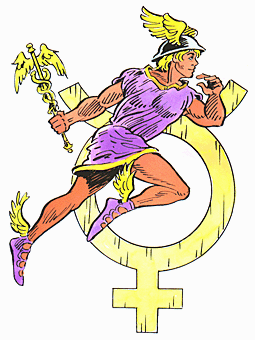Snakes entwined on his staff protect Mercury, messenger of the Roman gods. With a little imagination, you can visualize the snakes entwined in Mercury’s symbol below.


- One of the sons of Zeus was Hermes, son of the Greek Maia, was considered the messenger of the gods and so was naturally thought to be very swift.
- Mercury has been known since at least the time of the Sumerians (3rd millennium BC).
- It was given two names by the Greeks: Apollo for its apparition as a morning star and Hermes as an evening star; however, Greek astronomers knew that the two names referred to the same body.
- Heraclitus even believed that Mercury and Venus orbit the Sun, not the Earth.
- Hermes is usually pictured with wings on his sandals and on his cap and he was also the god of commerce, cunning, and invention.
- In ancient times, messages from one ruler to another or between armies were carried by “heralds” who had to be treated with respect and were not to be harmed.
- These heralds carried a special staff as the sign of their position and this was called a “caduceus” and Hermes carried such a staff.
- Supposedly because Hermes moved so quickly, the staff, as well as his cap and sandals, had wings.
- Of all the planets in our solar system, the one that moves most quickly against the background of the stars was naturally named after the swift-footed Hermes and the Romans identified their own god of commerce, Mercury, with Hermes, and so we know the planet as Mercury.
- Hermes, or Mercury, was the patron of travellers, merchants (deity of commerce), rogues, and thieves; as well as being the Roman wind deity.
- He also escorted the souls of the departed to Hades; and as that character, he was called Psychopompus and under the name of Oneicopompus, he was regarded as the lord of dreams and visions.
- His festival was celebrated on May 15, at which time merchants sprinkled themselves and their wares with holy water to insure large profits.
- Mercury is the source of words such as market, merchandise, merchant, and merciful.
- Lord of Wednesday.
- In astro-mythology, the messenger, being the intermediary between the four elements, air, earth, fire, water, and the phenomena produced by them.
A few scientific facts about Mercury:
- Innermost of the planets, Mercury swoops to within 46 000 000 km of the sun, then slows down as it swings out to some 70 000 000 km away.
- The spacecraft Mariner 10 sent back our first detailed pictures of Mercury’s Moon-like surface in early 1974.
- One of the spacecraft’s most important findings was that Mercury has a magnetic field strong enough to turn aside the mighty solar winds.
- Another finding was that Mercury’s surface is covered with craters that were probably made early in its history, when rocky meteorites up to several kilometers across crashed into the young planet.
- Until recently, people thought Mercury was the smallest planet; however, new observbations and measurements indicate that Pluto is smaller.
- Mercury’s orbit is more elliptical than the path of any other planet except Pluto.
- If orbits were racetracks, speedy Mercury would leave the other planets behind.
- It zips along at about one and a half times the speed of Earth.
- For all its speed, Mercury’s spin is slow; so slow that six Earth months go by before the Sun appears from one high noon to the next high noon.

The page of planet
images.
If you came here from the Hermes unit, you may return by clicking on this Hermes link.


 The page of planet images.
The page of planet images.
